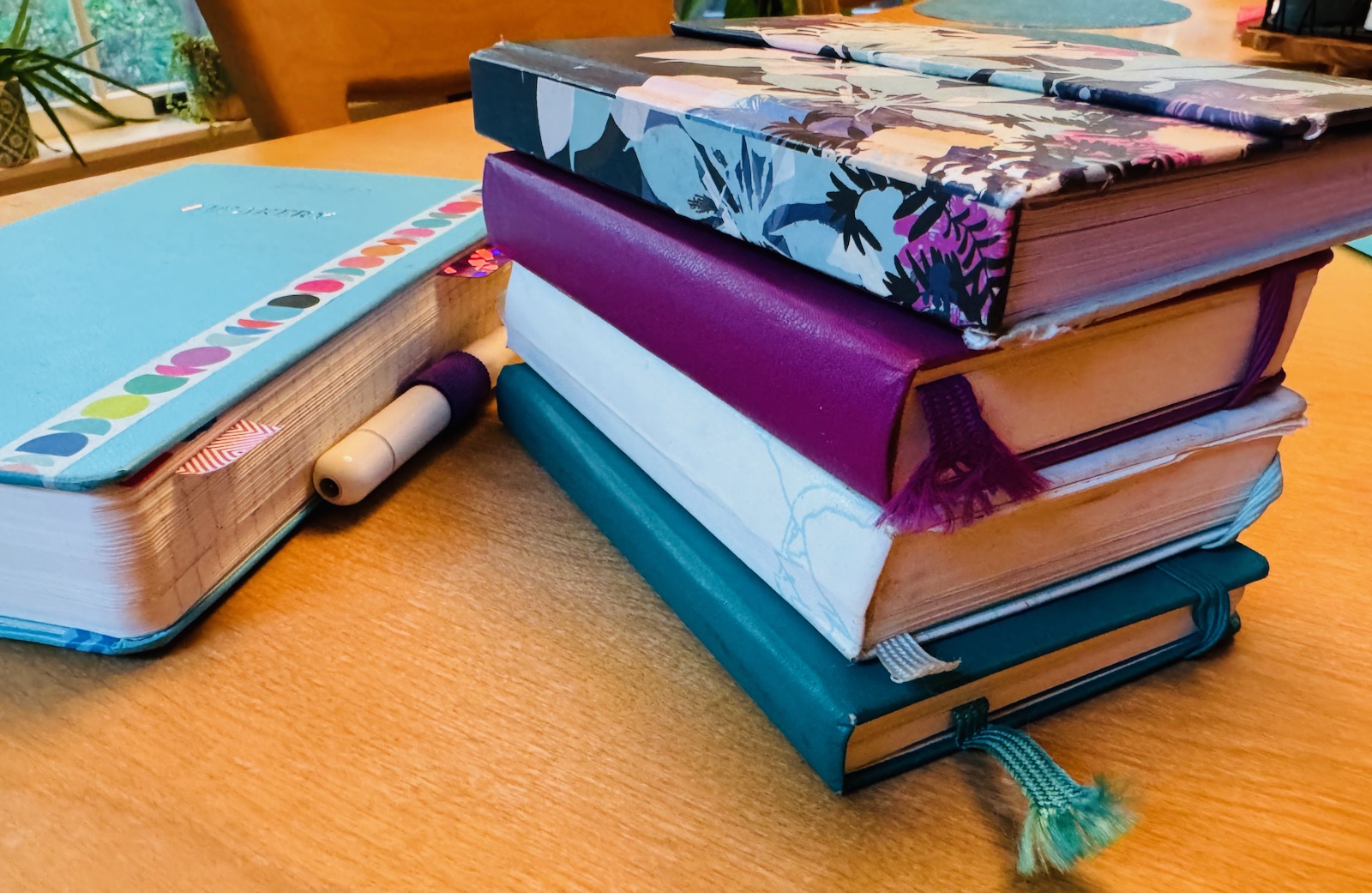Over the years, I’ve come to believe that daily journaling is the best method for consistent personal growth and emotional clarity.
If you haven’t kept a journal consistently before, or if it’s been a while since you were dedicated to journaling, I recommend writing daily for at least a month. Once you are in the habit of doing it every day, you can assess your needs and experiment with your schedule. See how you feel after a day or two off. Are able to get back into the swing easily? Or have you totally lost your momentum?
I wrote every single day for several months when I first began, and I did it until I wanted to write daily. Until it was no longer a chore or something to be crossed off my todo list, but an activity I looked forward to and depended on. Until I began holding that time sacred and protecting it possessively from intrusion.
Now I can go a day or two without writing and it doesn’t register on my radar. I normally write every weekday morning. I often don’t write on Sundays. Occasionally I skip Saturday, too. That means Monday is a “brace yourself” kind of journal entry. I have a lot to say, and it usually starts awkwardly. I feel like I haven’t written in forever.
If I go three days without journaling, I start to feel lost. I get cranky. Defensive. I lose perspective. I feel emotionally constipated. I start setting up decorations for the pity party. A week without writing and I’m a basket case – directionless and neurotic. But one meaty entry reels me back in. I re-center. I remember who I am and where I was going. I’m quickly back on track.
Because I go downhill fast when I’m not writing, I have a great incentive to keep it up. Who wants to consciously sign up for Directionless and Neurotic?
The longest period of time I’ve gone without journaling in the past two decades is one month. I took March of 1998 off because a friend believed writing about my problems was making me unhappy. She convinced me I needed a healthy dose of her drink of choice: blissful ignorance. In the spirit of scientific method, I gave it a shot. That’s the last time I follow her advice. They nearly mobilized the white coats and locked me up.
Returning to my notebook, fingers stiff, felt like coming home. If nothing else, that extended hiatus reinforced my desire for daily dedication to the page. I’ve been writing almost daily ever since.
Here are some of the benefits of daily journaling:
1. Establish a routine
When you write every day, journaling makes a space for itself in your daily routine, just like eating dinner and brushing your teeth. You don’t have to worry about whether or not you’re going to write – you just do it. I’ve used the daily commitment strategy with other tasks before, like exercising. I don’t waste time or energy debating whether or not to do it and I don’t have to juggle my schedule to put it off another day, meanwhile feeling guilty and rationalizing my laziness. I just do it every day. It’s easier.
2. Develop credibility
Your friends, family and housemates will see you’re serious about journaling, which may give you more power to set boundaries and make demands so you can keep at it. Folks will stop using air quotes when referring to your “little writing hobby” or your “secret diary.” You will demonstrate that it’s not a fad or a passing phase – this is something you are serious about. As a result, it may become easier for you to get help securing uninterrupted writing time.
For example, your spouse can distract the kids for half an hour so you can have some peace and hit the page. In my home, having credibility means my significant other makes dinner when he sees I’m writing. He also attempts to occupy my painfully needy cat (often in vain).
3. Keep up momentum
If you write every day, the pages pile up quickly, which is immensely satisfying and encourages you to continue. You make measurable progress that is easy to reflect on. Re-reading older entries reinforces how far you’ve come and gives you incentive to stay dedicated.
4. Invite big wins
There’s a magic point in my daily writing, around page 1.5, where breakthroughs inevitably occur. If I sat down grumpy and unfocused, certain I had absolutely nothing to say, you can bet something big is brewing. And halfway through the second page of the morning, it appears.
If I sided with my original belief that I had nothing to say, these epiphanies would never occur. Daily writing means you write whether you want to or not, whether you feel you “need to” or not, whether or not you think you have something to say. Hidden troubles and gems of inspiration are thinly veiled behind the doldrums, waiting to be discovered.
5. Build discipline
Honoring your commitment to yourself, even when you’d rather go to the movies or catch an extra hour of sleep, strengthens your discipline. Showing up regardless, because you said you would, bolsters your self image and establishes you as a person of your word. Trust in yourself increases, and your ability to follow through on other promises strengthens. You can commit to bigger and bigger things. Over time, you are able to accomplish any goal you set your mind to.
6. Gain perspective
Writing daily keeps the drama right-sized and on the page. When you are going through a rough patch, it’s hard to remember you didn’t always feel this way. It’s equally hard to imagine that you won’t feel this way forever.
When I was younger, I had a tendency toward depression. Depression seriously affects your perspective and prevents you from seeing a way out. You start to believe you have always been depressed, and you can easily lose hope of ever feeling happy again. But my journals were always there to remind me that just a week or two ago, I was content and enjoying simple pleasures.
If I go back even further, I can see how I was able to pull myself out of the last dark spell. I gain perspective and benefit from documenting what’s worked in the past. So if depression sneaks up on me again, it will have fewer teeth because I know I fought back successfully before and I’m confident I can do so again.
Daily journaling reminds me that contrary to how I’m feeling right now, I haven’t always felt this way, nor will I feel like this forever.
7. Identify patterns
If you write daily, over the course of a few weeks, you may begin to see useful patterns. Small things that may have escaped you now provide clarity, highlighting possible ways to improve your life or grow emotionally.
“I have a headache,” becomes, “I always seem to get headaches on Tuesday afternoons.” Which expands into, “Maybe the friend I have dinner with every Tuesday night is not supportive of the direction I’m trying to move in.”
Soon, you realize, “I need to meet some new people who are supportive of my path.”
8. Retire from crisis management
Journaling daily keeps you on top of issues, concerns, problems. You resolve conflicts more quickly and with less damage. Your journal becomes an “early warning” mechanism.
Think of it like the little red light on your dashboard, signaling that you’ve got another 50 miles before you run out of gas. Wouldn’t it suck if the car just quit? Isn’t it much easier to have that leeway to find a gas station and fill up – or shake the couch cushions for a few bucks so you can get to work? Then you can avoid that sheepish call admitting you ran out of gas in the middle of nowhere.
Same thing with journaling. For example, warning bells suddenly go off that you may be taking on too many projects and you’re in danger of splitting a seam. Instead of suffering a catastrophic burnout, you calmly delegate. Then you get yourself a massage and some extra sleep. The warning bells are silenced – another crisis averted.
Writing daily works for me and gets me where I want to go. I recommend you start daily and scale back from there if you feel the need. You can always write less, but give yourself the chance to enjoy the multitude of benefits you’ll gain from a dedicated daily journaling practice.




